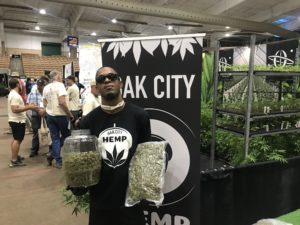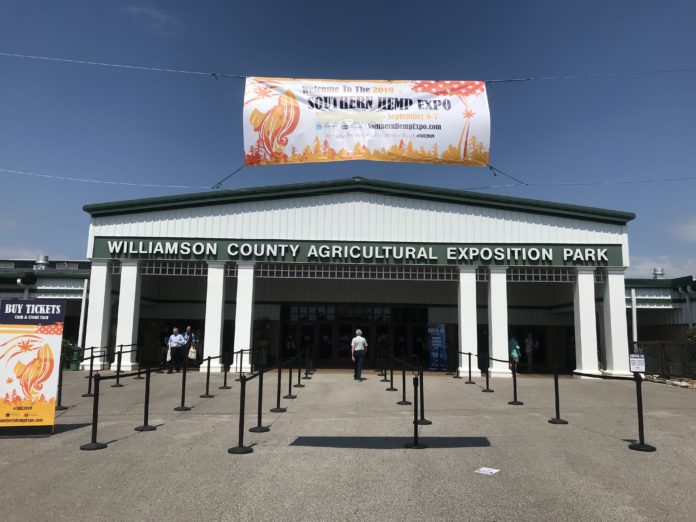While tobacco and cotton have dominated the Southern agricultural industry for most of the last century, hemp has taken the region by storm over the last few years, as farmers and processors have made big bets on the future of the industry in the U.S. and worldwide.
At the Southern Hemp Expo (SHE) in Franklin, Tennessee, last week, there was a heavy concentration of Southern farmers, processors, and small and large hemp/CBD brands in attendance. Many of the panels and informal discussions were focused on how to proceed in an industry that is still loosely regulated, with growing pains up and down the supply chain, and federal regulations looming on the horizon.
SHE organizer Morris Beegle is the president and co-founder of the WAFBA (We Are For Better Alternatives) family of brands, which includes the NoCo Hemp Expo (NOCO), Silver Mountain Hemp Guitars, Tree Free Hemp, and the Hawaii Hemp Conference. He explained that Tennessee is a perfect location for the conference because the state has more registered farmers than any other state, with more than 3,000 licensees, up from just a few hundred in 2018. While the NOCO conference in Colorado has been operating since 2013, the Southern Hemp Expo is in its second year, and a long line out the door for walk-up tickets on both days suggests it’s here to stay.

“NOCO is a more mature show, and here it’s still behind the curve,” Beegle observed. “It’s good for the South to have this Colorado influence to help normalize this plant beyond hemp. There is an educational bell curve, and people shouldn’t be scared of cannabis. You have a lot of super smart farmers here in the South who can make things happen.”
A real deal farmer’s market
On the exhibition floor, vendors from neighboring states including Kentucky, North Carolina, and South Carolina, along with companies that made their way from Oregon and Colorado, were hawking hemp flowers, oils and other hemp-based products, and a variety of agricultural and ancillary services. One of the unique aspects of the hemp market in Tennessee is that it allows consumers to buy hemp flowers for smoking (allowing for immediate CBD absorption), which is a sight to behold. There were customers young and old surveying the products, chatting up hemp farmers—trying to determine which strains might best treat their symptoms or needs—and sometimes walking off with several pounds of flowers in vacuum-sealed bags. Farmers on the West coast can only dream about such a scenario for cannabis.

Josh Hendrix, director of business development for domestic production at CV Sciences and host of the “Hemp Happy Hour Podcast,” said the market for smokable hemp flower is something that took both the industry and regulators by surprise, and Tennessee is the only state in the South where it’s legal.
“Now the big argument is smokable flowers, and I can tell you there wasn’t a legislator in [Washington] D.C. who thought we’d be smoking hemp, because all we did for five years is go up there and say ‘you can smoke a whole telephone pole of hemp and it won’t get you high, so nobody would ever want to smoke this,’” said Hendrix.
Hot-button topics
One of the most heavily attended sessions at SHE was the business conference, where farmers, processors, and industry experts discussed the hot-button topics of the day, and tried to make sense of an industry that has more than its fair share of inconsistencies, anomalies, and unknowns. Some of the most discussed topics included:
- The oncoming regulations from the USDA and FDA for hemp farming, processing, and retail.
- The need for standardized lab testing across the industry to create a level playing field for operators, and giving consumers consistent, trusted products.
- The need for a higher THC threshold in hemp farming—raising the allowable level from 0.3 percent to 1 percent—to allow more flexibility in genetics and farming methods.
- The oncoming glut of hemp this year, with key states doubling their production, and the inevitable price drop that will follow
- The need for a more reliable supply chain, with standardized contracts and agreements on pricing models and terms between farmers and processors.
- The need for more stabilized seed stock, which eventually will have to be certified by the USDA.
- Whether or not the FDA will crack down on the isolate market and allow companies to use it for formulations in the future.
- New hemp strains that are rich in CBN and CBG, which are two of the most promising cannabinoids in terms of their medicinal properties.
- The amount of hemp stalks and fiber being wasted currently, and how to start building the infrastructure to support industrial hemp production.
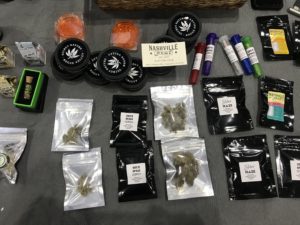
Tulsi Gabbard’s ‘Hemp for Victory Act’
Tulsi Gabbard (D-HI), one of the most cannabis-friendly presidential candidates, made a Skype appearance to deliver a short keynote and talk up her “Hemp for Victory Act,” Bill 3652, which she introduced in Congress this summer.
“I am campaigning to lead our country toward a future where our hemp industry is thriving and booming,” she said. “Recognizing how much work has brought us to this point, but how much more is ahead of us. It’s been frustrating to see how long it’s been for us to get here, where small business and farmers can come together to make this industry thrive.”
If passed, the Hemp for Victory Act will help modernize the hemp industry, develop specific guidelines, and encourage federal research and data collection to give consumers and politicians a clearer picture of the industry’s potential. The bill focuses on research into the plant’s therapeutic values, its potential as an alternative to plastics, and its ability to prevent soil erosion.
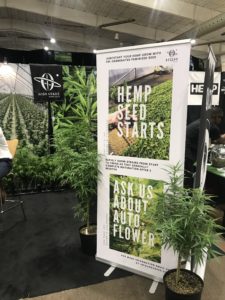
“The reason why I introduced the Hemp for Victory Act is because we need the research, the data, and information that is accurate so we can look at how best to support and maximize each of these different areas of opportunities, and make sure the large, multinational agribusinesses don’t’ just come in and shut out all of you,” she said.
Is a hemp glut in the works?
One of the biggest concerns for farmers in 2019 is the prospect of a glut, similar to what happened on the West coast with cannabis in 2018, and the resulting freefall in prices for flower. Farms in Colorado, Kentucky, and Oregon will be harvesting three to four times the volume they did in 2018, and processors are now being very selective about the farms with which they work. Many farmers across the U.S. are growing hemp without contracts with processors, or a game plan for their harvest.
“We’re growing enough hemp in Kentucky to supply every man, woman, and child, 320 million people, with 25mg of CBD every day,” said Joe Hickey, a hemp advocate in the Kentucky industry since the early 1990s and currently the chief executive officer at Halcyon Holdings. “In Mexico you’ve got a half million acres, and same with South Africa, and you’ve got Bolivia, Uruguay, Columbia, and Peru. The storm is coming, because there is going to be so much material out there.”
Franny Tacy, co-founder of Franny’s Farm in Asheville, North Carolina, said farmers in her state are not being diligent enough about growing marketable hemp strains under the proper, rigorous standards. She said the state has been gathering data on the industry, and that 60 percent of the farms lost money last year.
“We are seeing tons of biomass in our state that will never be sold because it was not the right quality. If you are not growing for quality, you will not make money,” she said.
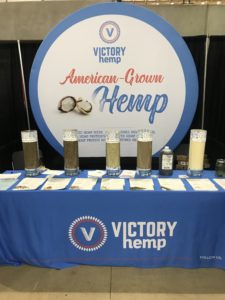
Processors are also concerned about the lack of consistent, high-quality hemp being grown, and they can afford to be very choosy about who they contract with. Bill Abbott, co-founder of Gemini Extraction & Refinement in Colorado, said his clients are starting to demand more and more traceability up and down the supply chain, which means that farmers need to adopt more stringent and standardized production practices.
“The traceability issue is going to be huge,” Abbott said. “Know what you’re growing and know your extractor. Make them show you they can do what they say you can do. Eventually, the FDA will come to the processors and we will be the bearer of bad news to the farmers—unless you are practicing GMP, we can’t accept your flower and put it on the market. So understand the supply chain, that’s the biggest thing.”
Joshua Camp, co-Founder of LabCanna, the first licensed hemp processor in Tennessee, said the current pricing structure for hemp is askew, and that farmers should brace for less favorable terms in the coming years.
“Right now, the hot topic because of processing costs is what can we afford to pay the farmer,” said Camp. “So $3 to $4 per point for a CBD crop doesn’t make sense when the market for CBD is $2500 to $3000 per kilo. Farmers are asking us to work at a 5 percent margin, and that doesn’t work.”
Julie Lerner, chief executive officer at PanXchange, the industry’s first institutional-grade industrial hemp exchange, said prices for hemp flower have dropped about 60 percent since April. Five years ago, the price for CBD isolate was about $50,000. Today it is $3,650.
“I have so much empathy for people in this space because of all the uncertainties this year,” said Lerner. “On the biomass side, I would say do what you can to get reliable partners, working capital, and drying and storage facilities. The more you have of all of those, the better off you’ll be for any circumstance.”
